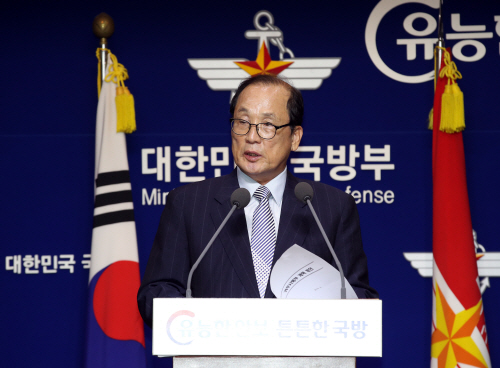 |
| Chang Young-dal, the head of a task force to reform the Defense Security Command (DSC), speaks during a press conference at the defense ministry in Seoul on Thursday./ Source: Yonhap News |
By AsiaToday reporter Joo Sung-sik
The Defense Security Command (DSC), which has been controversial due to its surveillance of the families of victims of the Sewol ferry disaster and its alleged production of a document over the potential invocation of martial law to quell massive anti-government protests last year, will be undergoing sweeping changes that would largely disband the organization. The Defense Ministry's DSC reform committee has decided to push for creating new institutional underpinnings in order to demolish presidential decree and other legal frameworks for the DSC operations and to create a new military agency.
The taskforce recommended to greatly reduce the number of existing DSC agents in charge of security and anti-terrorism affairs, and to decide among three proposals for overhauling the DSC. The first scheme is to carry out a fundamental reform while maintaining the basic command structure. Another plan is reshaping the DSC into an organization subordinate to the defense ministry. The final idea is creating an independent government agency.
Chang Young-dal, head of the Defense Ministry's DSC reform panel, revealed that he delivered a set of proposals for DSC reform to Defense Ministry Song Young-moo in a press conference held at the defense ministry in Seoul on Thursday.
"We decided to abolish all of the institutional underpinnings that currently support the DSC, such as presidential decree," Chang said. "We will push for creating new institutional underpinnings if a new agency is established."
"We will ensure that the military's intelligence unit will never intervene in politics nor do any activities that would impact troop morale," Chang said.
Chang said he delivered three plans in parallel to the defense minister to choose from: maintaining the basic command structure, operating the unit subordinate to the defense ministry, and creating an independent institution through legislation.
"We proposed to slash the total number of DSC agents by 30 percent or more to create a professional elite gorup," Chang said. "We decided to abolish DSC agents in regional cities and local provinces under the reform plan."
"Once those reform plans are put in place, we expect the DSC's illegal political interference, surveillance over innocent civilians and misguided sense of privilege over other military branches will be eradicated," Chang added.
#DSC #defense ministry #reform #Defense Security Command #taskforce
Copyright by Asiatoday
Most Read
-
1
-
2
-
3
-
4
-
5
-
6
-
7





















